Pancreatic Cancer
Pancreatic cancer is a serious and deadly form of cancer that develops when cells in the pancreas experience abnormal growth. Early diagnosis increases the chances of successful treatment and gives those diagnosed with pancreatic cancer the best opportunity to live long and meaningful lives.
What You Need to Know About Pancreatic Cancer
Pancreatic cancer is a serious and potentially deadly form of cancer that affects the pancreas, a vital organ in the digestive system located at the center of the abdomen. The pancreas helps to digest food and produce insulin and other hormones, so when it is impacted by cancer, these processes begin to suffer.
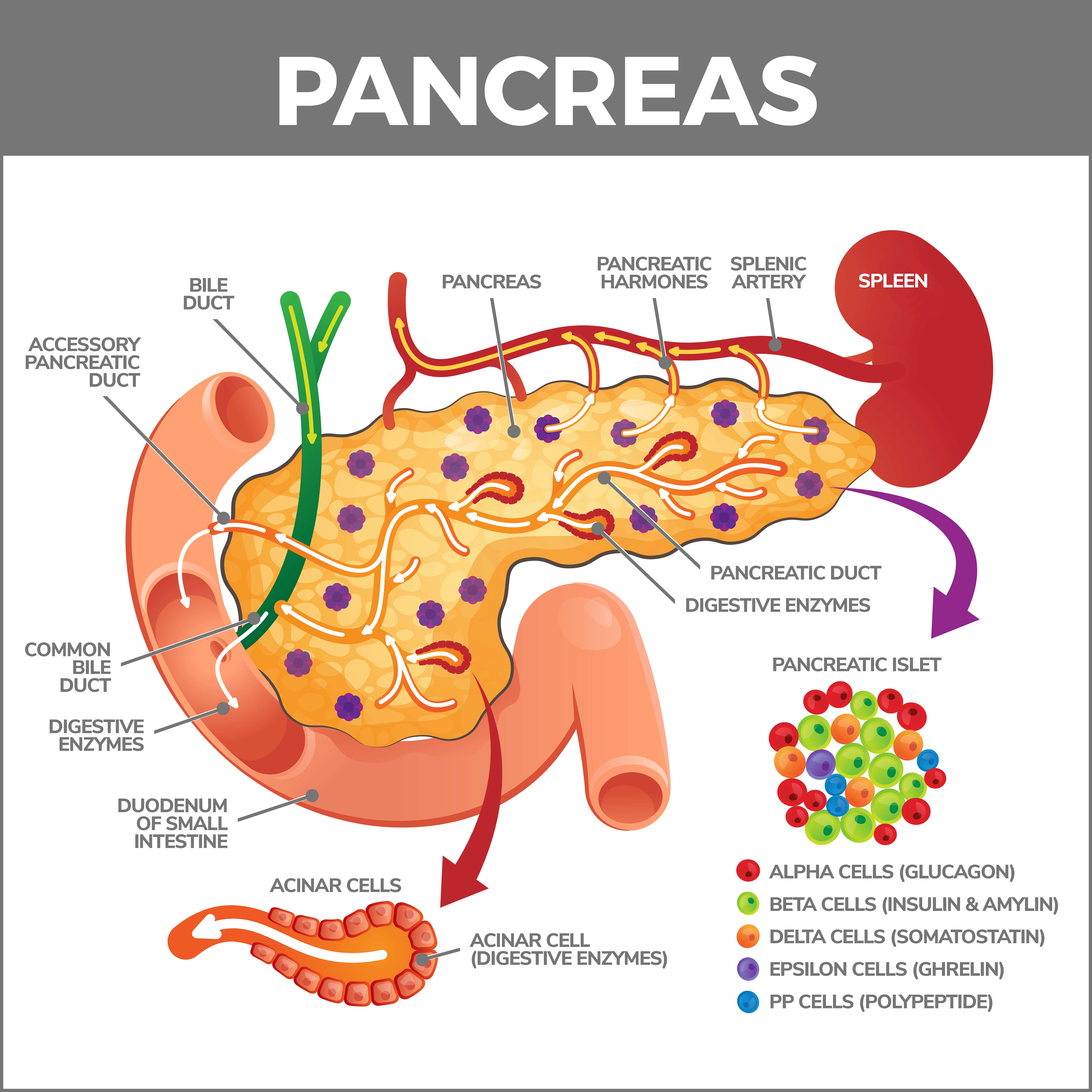
The pancreas, shaped like a flat pear, is located behind the stomach and in front of the spine. Its size ranges from 6-10 inches long, and its primary purpose is to aid in the digestion of food, produce insulin and other hormones, and regulate blood sugar levels.
When abnormal cells in the pancreas divide and spread uncontrollably, it can cause a tumor to form. Pancreatic tumors can be benign and non-cancerous, but in some cases, they may be malignant and cancerous. Depending on the type of tumor, symptoms can vary.
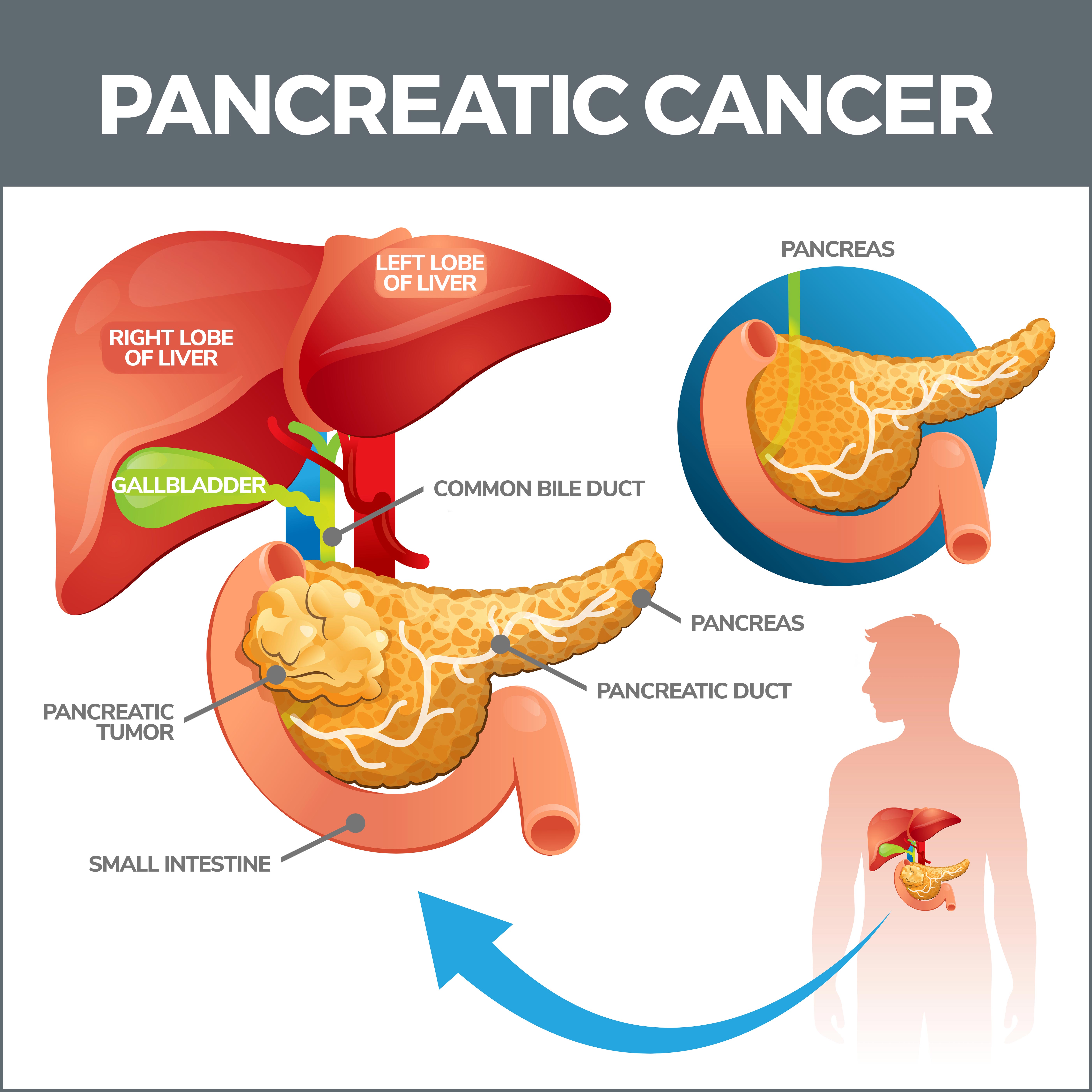
What Causes Pancreatic Cancer?
The exact cause of pancreatic cancer is unknown. Research suggests that certain risk factors increase the chances of developing this cancer, including:
- Age – The risk of pancreatic cancer increases as you get older. As people age, the cells in their bodies become less able to repair themselves when damaged, leading to an increased risk of cell mutations. The immune system decreases in function as people age, making them more susceptible to diseases and cancer.
- Gender – Studies show that men have a slightly higher risk of developing pancreatic cancer than women. This may be due to biological and lifestyle differences between the sexes.
- History of pancreatic disease – Some forms of pancreatic disease can increase the risk of developing pancreatic cancer. This is because these diseases can lead to inflammation and cell damage, making the pancreas more susceptible to cancerous mutations.
- Smoking – Increases the risk of pancreatic cancer because the chemicals in cigarettes damage the cells in the body, making them more likely to become cancerous. Smoking lowers the effectiveness of the immune system, leading to an increased risk of infection and cancer.
- Obesity – Being overweight or obese can increase the risk of developing pancreatic cancer because obesity can have many negative effects on the body, such as inflammation and hormonal imbalances, both of which can lead to cancer.
- Diabetes – Having diabetes increases the risk of pancreatic cancer, especially if uncontrolled. Diabetes is linked to insulin resistance, which can cause cells to divide uncontrollably and form abnormal growths. Diabetes can cause high blood sugar levels, which may lead to tissue damage and cancer.
- Genetics – Your risk may be higher if you have a family history of pancreatic cancer. This is because certain genetic mutations can be passed down from generation to generation, leading to an increased risk of cancer in those with a family history of it.
It’s important to note that these risk factors don’t necessarily mean you will develop pancreatic cancer, as they are simply indicators that could increase your likelihood of developing the disease.
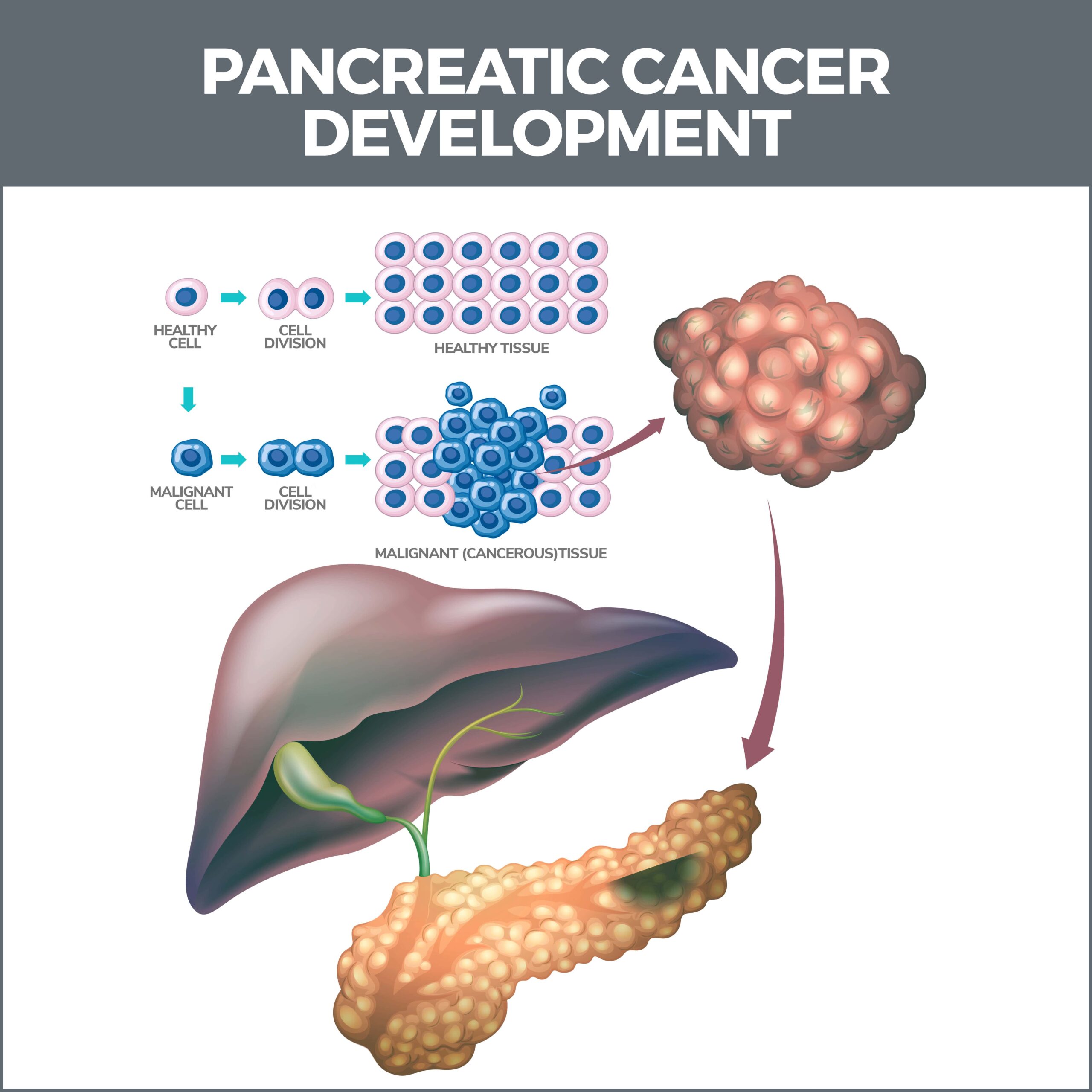
What Are the Symptoms of Pancreatic Cancer?
The most common symptoms of pancreatic cancer are:
- Pain or discomfort in the abdomen.
- Jaundice (yellowing of the skin and eyes).
- Loss of appetite or weight.
- Fatigue.
- Bloating or abdomen swelling.
- Dark-colored urine.
- Blood clots.
- Itchy skin.
Nausea and vomiting can also occur, and symptoms may be more pronounced if an abscess or tumor is present. Abdominal pain can be intense and often located in the upper abdomen, and loss of appetite can also occur.
Pain or discomfort in the abdomen can range from mild to severe and cause abdominal swelling. It is also common for pain to radiate toward the back and shoulder areas. The pain may be sharp or dull and can cause difficulty eating, sleeping, and even moving.
Jaundice may occur due to an obstruction, which causes bile to accumulate in the body. It can cause skin and the whites of the eyes to appear yellow or orange, and is usually accompanied by severe itching.
Weight loss can occur due to a lack of appetite or the body’s inability to absorb and process carbohydrates, proteins, and fats. Fatigue and weakness can also occur due to decreased caloric and nutrient intake.
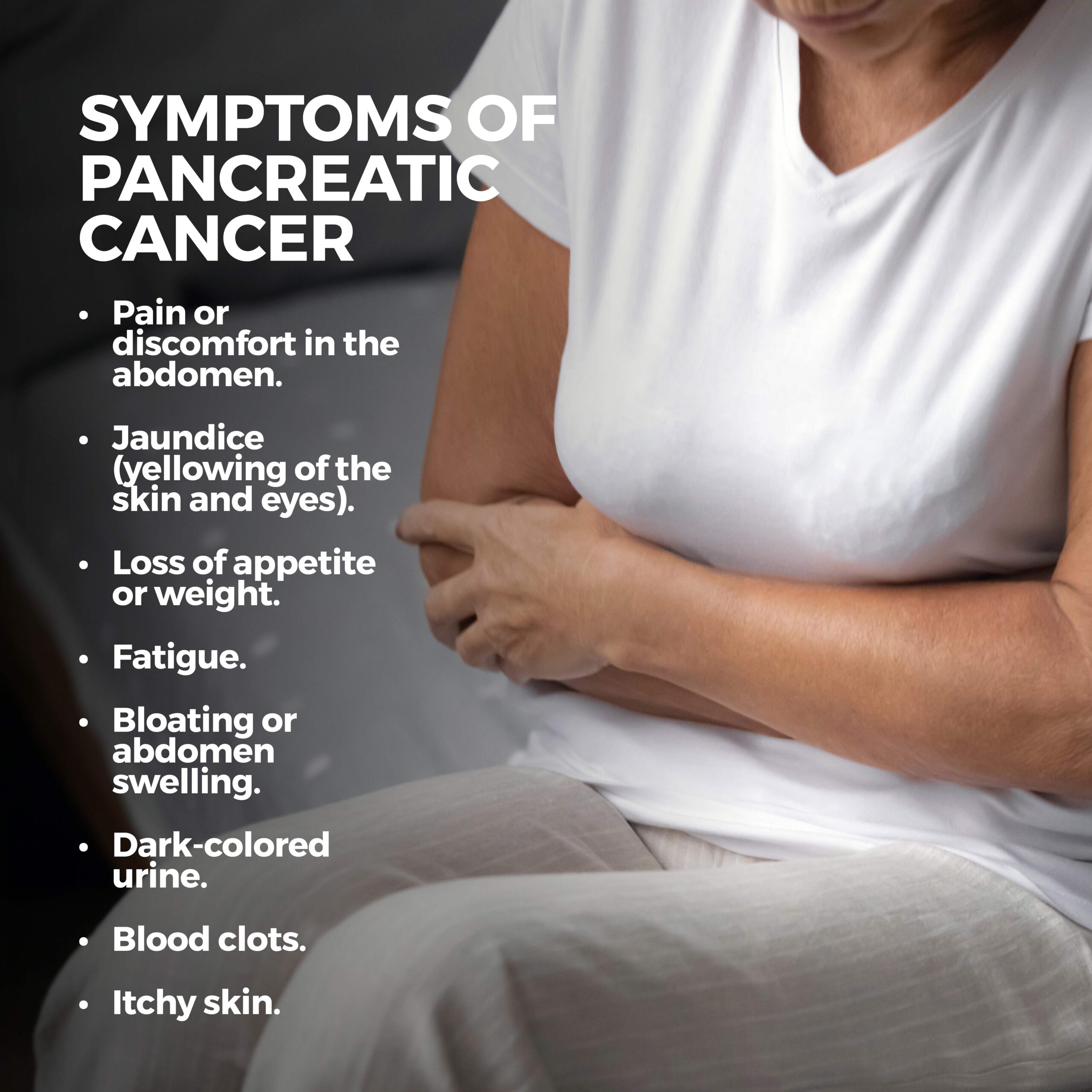
Nausea and vomiting may happen if a tumor is pressing on the stomach or bile cannot flow properly. It can also occur as a side effect of chemotherapy used to treat the cancer.
Dark-colored urine is another symptom of pancreatic cancer and is caused by the accumulation of bile. Blood clots may also form due to changes in the blood resulting from cancer’s disruption of clot formation. Itchy skin occurs due to the accumulation of bile salts, causing severe itching and skin irritation.
How Is Pancreatic Cancer Treated?
The type of treatment for pancreatic cancer depends on the stage and size of the tumor. Treatment may include surgery, chemotherapy, and radiation therapy. Surgery may be used to remove the tumor and some of the surrounding tissue. Chemotherapy and radiation therapy are used to shrink the tumors further and reduce the spread of cancer cells.
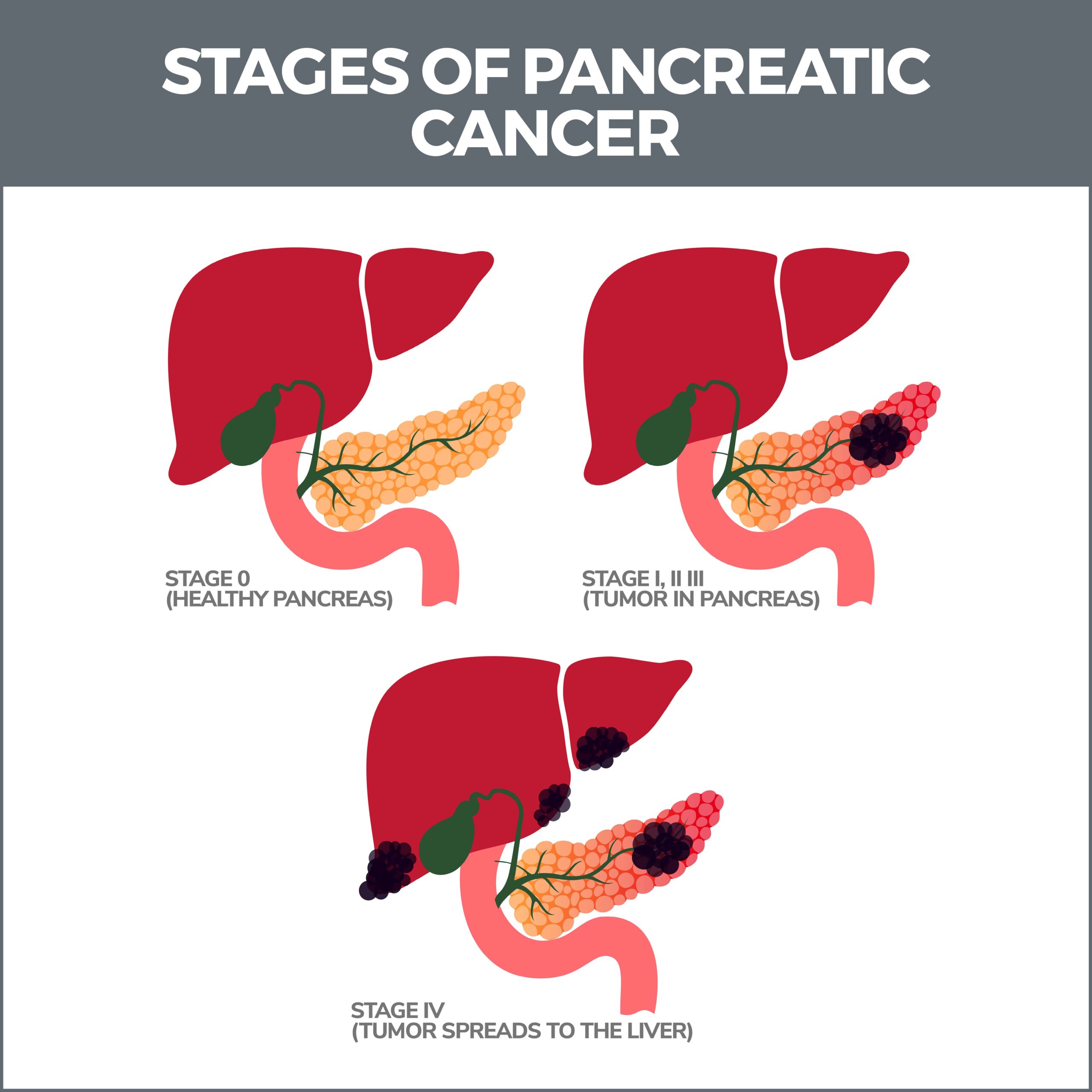
What to Expect During Treatment
Surgery
Depending on the size and extent of the tumor, surgeons may only remove (resect) the cancerous tissue, or they may opt to do a Whipple procedure, a complex surgery that involves removing the head of the pancreas, the gallbladder, a part of the small intestine, and nearby lymph nodes. During the procedure, patients may experience pain, which may be relieved with medications. Depending on the severity of the tumor, the surgery may take several hours or even days. In some cases, patients may need a feeding tube inserted or a partial or complete pancreatectomy. After the surgery, patients may experience swelling, soreness, or a feeling of tightness around the affected area. They may also experience nausea, vomiting, diarrhea, and constipation.
Chemotherapy
Chemotherapy is used to kill cancer cells, but it can also damage healthy cells. As a result, patients may experience side effects such as nausea, fatigue, anemia, hair loss, and infection. Patients may also experience changes in mood and appetite. Chemotherapy drugs come in many different forms, including pills, injections, intravenous infusions, and topical ointments. Depending on the severity of the cancer, patients may need to receive multiple doses of chemotherapy, both before and after surgery.
Radiation Therapy
This type of therapy uses high-energy X-rays or other forms of radiation to kill cancer cells. Possible side effects include fatigue, nausea, skin irritation, and hair loss. Radiation therapy can cause long-term side effects, including infertility and a slightly increased risk of developing other cancers. Patients may receive radiation therapy in multiple doses, either alone or in combination with chemotherapy. Depending on the severity of the cancer, radiation may be given before, during, or after surgery.
Recovery After Treatment
Recovery after treatment for pancreatic cancer usually takes several weeks, but it can vary from person to person. It’s important to rest and follow your doctor’s instructions to ensure your recovery goes as smoothly as possible. Ask your doctor what medications and lifestyle changes you should consider to help you through your recovery.
Contact Us
At Gastro MD, we understand that a cancer diagnosis can be overwhelming, which is why we have developed an individualized approach to treatment for each of our patients. Our multidisciplinary team of experts will assess the stage of your cancer and create a treatment plan designed to give you the best possible outcome. We are equipped to help you navigate this difficult journey and ensure you get the care and support you need.
Call us today! The team of professionals at GastroMD looks forward to working with you. We are one of the leading gastroenterology practices in the Tampa Bay area. We perform a host of diagnostic procedures using state-of-the-art equipment in a friendly, comfortable, and inviting atmosphere where patient care is always a top priority!



